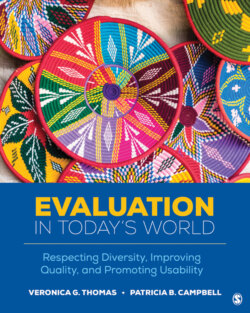Читать книгу Evaluation in Today’s World - Veronica G. Thomas - Страница 156
На сайте Литреса книга снята с продажи.
Carol H. Weiss
ОглавлениеCarol H. Weiss was probably the most prominent female evaluation theorist and practitioner of her time. In the mid-1960s, Weiss evaluated a Harlem-based training project as part of President Johnson’s War on Poverty. This yielded invaluable lessons that Weiss later disseminated through her scholarship. Her 1972 book, Evaluation Research: Methods for Assessing Program Effectiveness, provided an in-depth analysis of many of the crucial and complex issues that plague evaluators and public managers. While many of the criticisms of the time focused on methodological inadequacies, Weiss (1986) also pointed to issues related to the lack of fit between evaluation and the sociopolitical context of the program world. She noted that
evaluation is narrow because it focuses on only a small set of questions of importance to program people; unrealistic because it measures the success of programs against unreasonably high standards; irrelevant because it provides answers to questions that no one really cares about; unfair because it is responsive to the concerns of influential people, such as bureaucratic sponsors, but blind to the wants of others lower in the hierarchy, such as front-line staff and clients; and unused in councils of action where discussions are made. (p. 149)
Weiss (1993) called for a reconceptualization of the purpose of evaluation from simply judging program merit and worth, to also generating reliable knowledge that could guide improvement. She also stressed the need for evaluators to gain a better understanding of the political context and its influence on their work:
Photo courtesy of Martha Stewart (photographer)
Now I have more understanding how difficult it is to bring about improvement in long-standing stubborn problems, like poverty and violence. The experience of the 1960s and 1970s showed us that even under relatively favorable conditions, progress was slow and uneven. To change social conditions in the swift, massive fashion that we yearned for was much harder than we expected. I have come to have more respect for the incremental changes that evaluation helps to bring about. If evaluation contributes to making small continuing improvements in current policy, as I think it does, this is no small beans. It is well worth our time and effort. (Weiss, 1993, p. 109)
Probably Weiss’s major contribution to the historical evolution of evaluation is her sustained effort to push the field toward better recognition of programs as not neutral, antiseptic, laboratory-type entities but instead as entities that emerge from the “rough and tumble” of political support, opposition, and bargaining—attached to which are the reputations of legislative persons, the careers of administrators, the jobs of program staff, and the expectations of clients. Even rigorously documented evidence of outcomes, Weiss (1993) adds, may not outweigh all other interests and concerns, and only with sensitivity to the politics of evaluation research can evaluators be as creative and strategic as they can be. Insights from Weiss’s 11 published books and more than 100 articles continue to shape how evaluators think about theory and practice evaluation.
